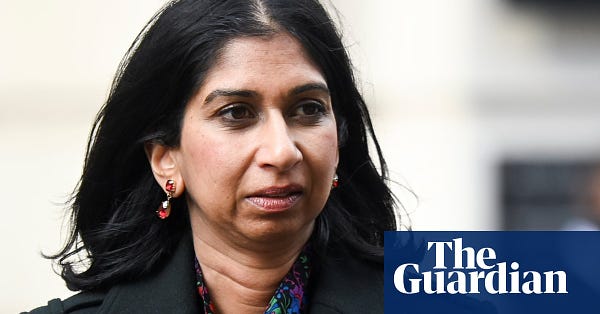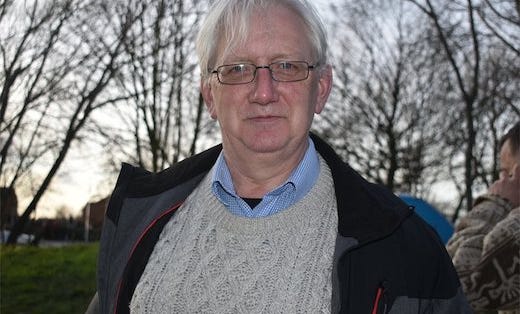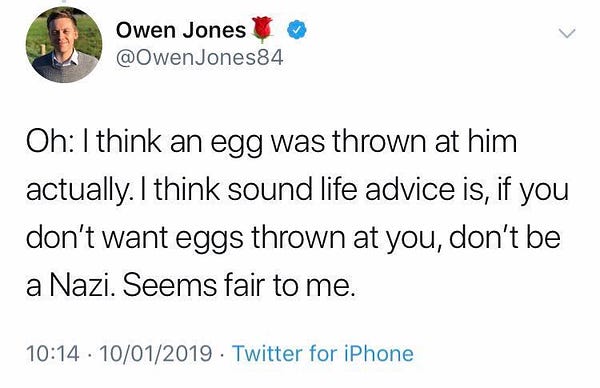Rachel Riley libel ruling is the latest judicial attack on political speech
The British judiciary is accumulating more weapons to crush political speech that challenges establishment narratives
[First published by Mint Press]
Assaults on the right to speak, and to think, are coming thick and fast. But the significance – and coordination – of all these developments is being largely missed.
Those who try to open up a little space – in politics, academia, and journalism – to think critically about our society and how power is misused are the chief targets. Western establishments have grown increasingly concerned about the expansion of popular freedoms that arrived with social media a decade or so ago, which have allowed us to analyze and critique elite interests and strategies. This has posed a very obvious threat to the establishment’s continuing ability to propagandize us and has led to far more unpredictable and unstable social and political landscapes.
Our increased ability to bypass corporate, billionaire-owned media has led to inevitable polarization. We have seen the emergence of three antagonistic tribes, based largely on the way each consumes media.
Liberals and the traditional right tend to show little interest in the wealth of new critical information, regarding as authoritative only those outlets that belong to the corporate media. As a result, liberals and the traditional right tend to assume either that the system works relatively well or that, at least, it works in their favor. They favor mainstream political parties that protect elite interests.
The populist left has slowly understood that the institutions and networks of power that rule over us are systematically corrupt, and that they will continue on the current ecocidal path to maintain their power. This left is internally divided – and largely ineffective – because it cannot agree on whether the remedy is to be more assertive in seeking reform or to work towards overthrowing the corrupt system.
The populist right also appreciates that the system is corrupt but struggles to see this corruption as anything more than a temporary problem. It is easily triggered by the obsessive focus of liberals on divisive social issues, premised on identity politics. Importantly, it believes a charismatic leader can reverse course by sweeping away the liberal elites who occupy what they see as otherwise-well-intentioned institutions.
Fog of propaganda
Both of these last two groups are a potential threat to Western establishments, especially if they can more effectively break through the fog of propaganda to see clearly what we are really up against.
In consequence, we have been witnessing a concerted backlash from the establishment against the digital freedoms that recent technological innovations have inadvertently unleashed. The establishment has, of course, dressed up this assault on the right to know what is really going on as “democracy defending itself.”
Journalism has become a key battleground. New kinds of popular journalism have emerged over the last decade, made possible by the leveling-up role of digital technology. Julian Assange, the founder of WikiLeaks – which made it safer for whistleblowers to get information out to the public about the crimes being committed, and the lies being told, by our elites – is now in a London high-security jail charged with “espionage” for revealing U.S. and U.K. war crimes in Afghanistan and Iraq. His prolonged confinement and psychological torture have sent a powerful message to other journalists about the dangers inherent in scrutinizing elite interests.


But much of the effort to crush the new critical thinking happens more covertly. All criticism of elites – whether of the informed variety based on the leaks published by groups such as WikiLeaks, or of the deluded variety typified by the Pizzagate-style conspiracies of the disaffected right – is being bundled together as “fake news.” Algorithms are being gradually manipulated to disappear critical voices of both kinds, while social media companies are taking advantage of the new censorious mood among the public – whipped up by the elites – to justify social media bans, even of a sitting U.S. president. In these Orwellian times, free speech is presented as a threat to freedom.


Power shielded
Efforts to course-correct have been evident in politics too.
Populists have been able to ride the groundswell of opposition to elites – whether authentically in the case of leftwingers such as Jeremy Corbyn and Bernie Sanders, or inauthentically by rightwingers such as Donald Trump, Boris Johnson and Jair Bolsonaro.
The technocratic, Western “democracies” that had become so expert at concealing the exercise of power in the interests of a narrow elite have found themselves in trouble. On the one hand, the concentration of power and wealth, and the continuing imperial wars of resource theft overseas and inaction on the climate emergency at home, have been substantively challenged by the populist left. And on the other, the plutocratic nature of the structures the elites have built to shield their power have been made uncomfortably explicit, even to liberals, by the transparent, power-hungry, narcissistic politics of the populist right.
Just as critical, power-scrutinizing journalism is now classified as espionage and disinformation, populist politics has been declared antisemitic, a threat to national security, and treasonous.
Judicial lawfare
But one feature of this assault on our freedoms to think, speak, and act has gone largely unremarked. And that is the clear cooption of the judicial establishment to provide a veneer of legality – due process – as these freedoms are hollowed out. In tandem with discourses about “fake news” and “disinformation,” elites are waging lawfare through the judiciary against our right to discover truths they are determined to keep concealed.


This policy has been particularly evident in the U.K. The Assange case has already been referenced. A series of increasingly senior British judges have agreed with self-serving efforts by U.S. elites to define journalism that holds power to account as “espionage.” The U.K. government has been formulating legislation to give its own stamp of approval to this smearing of power-scrutinizing journalism.
Using slightly different tools, a judge recently jailed the prominent blogger Craig Murray, a former British ambassador, for his own truth-telling. This time she did not rely on the pretext of “espionage.” She selectively used instead “contempt of court” – making the collusion between the state and the judiciary even more explicit.
In innovating a crime of “jigsaw identification” (the idea being that some journalists could be held accountable for contributing pieces of a jigsaw that identified plaintiffs in a trial while other journalists who contributed different pieces of the jigsaw were not to be held accountable), the judge even went so far as to create two classes of journalist, each offered different protections under the law. Those salaried employees of the billionaire-owned media are presumed to be incapable of jigsaw identification, while independent journalists – those free of corporate pressures – risk the full weight of a vengeful penal code if they upset powerful interests. The judge alone gets to decide what constitutes, and who is guilty of, “jigsaw identification.”
By drawing on his insider knowledge of the workings of the British establishment, Murray has been at the forefront of critiquing issues considered central to the U.K. security state’s interests. For example, he regularly highlighted the glaring inconsistencies and contradictions in the resuscitated Cold War narrative surrounding the poisoning of the Skripals back in 2018. He was one of the very few journalists to scrutinize the glaring judicial improprieties in the proceedings to extradite Assange. And he has been a relentless thorn in the side of a glaringly corrupt Scottish elite as they not only continue to evade their promise to pursue independence but seek to demonize anyone who might try to hold them to account.


Defamation weaponized
Despite the obvious significance of these judicial rulings that have severely curtailed the right of journalists to monitor the centers of power, neither the Assange nor Murray cases received even a tiny fraction of the coverage they deserved. The corporate media – the supposedly “free press” – colluded through its silence in the judiciary’s own silencing of independent journalism.
But a separate legal case that reached its conclusion shortly before Christmas also needs highlighting as yet another front in this judicial attack on the right to speak — one with severe implications for the public as well as journalists. After espionage and contempt, we can now add “defamation” to the list of legal tools that are being weaponized to crush critical thinking.
So draconian is this undermining of a basic right to speech that I will have to be extremely cautious in how I write about this ruling. The defamation case was brought by Rachel Riley, a TV-show host who, during Corbyn’s tenure as leader of the Labour Party, harnessed her minor celebrity status to promote a strongly anti-Corbyn line.


Riley regularly took to social media to bolster the establishment’s “antisemitism” narrative against Corbyn: that he and the party he led were a threat to British Jews. As I and others have pointed out endless times before, this narrative was both entirely evidence-free and McCarthyite in nature.
The narrative fueled a classic witch hunt: anyone who followed the evidence and denied that Labour suffered from an especial antisemitism problem – mainly those who identified with the anti-racism, anti-imperialist, democratic socialist politics of Corbyn – was burnt at the stake.
It was treated as a confirmation of Jew-hatred to note that all the evidence indicated Labour had less of a problem with racism than both the Conservative Party and wider British society – or that, as a result, it seemed likely antisemitism was being weaponized to vilify a socialist politician who had unexpectedly risen to a position from which he could challenge for power.
Trend of violence
Riley has resorted to incendiary language and imagery against Corbyn and his supporters, stirring the passions of her followers on the subject. (In the photo, above, she altered the text of a protest placard Corbyn carried against apartheid South Africa, at a time when the U.K. government was a close ally of Pretoria. She thereby twisted Corbyn’s anti-racism into evidence of his racism.)
Her campaign against Corbyn has, of course, assisted the establishment narrative rather than challenging it. For that reason, she was exempt from the criticism faced by those sympathetic to Corbyn, who often responded to her in equally vehement terms. Riley, like many others, was able to exploit the fact that the discourse playing-field about Corbyn and his supporters, policed by traditional and new media alike, was far from level.
This inequity was at the heart of a legal defamation suit Riley launched in 2019 against Laura Murray, then an assistant to Corbyn. Riley had effectively initiated the online encounter by making a post on Twitter in March of that year after Corbyn was attacked, during a visit to a London mosque, by an ardent Brexit supporter who lunged at him and hit him on the head with an egg.


The incident came in the wake of other serious attacks on MPs, including the murder of Labour politician Jo Cox three years earlier, and was a part of a continuing trend of violence towards MPs that led recently to the murder of Conservative MP Sir David Amess – all disturbing evidence of the growing polarization of British politics.
But for Riley, the attack on Corbyn appeared to offer another opportunity to amplify her long-running insinuations that Corbyn was an antisemite. She recycled an old tweet from Owen Jones, a Labour activist and Guardian columnist, who had previously observed: “If you don’t want eggs thrown at you, don’t be a Nazi.” Jones was referring to an incident back in 2009 when eggs were thrown at Nick Griffin, the leader of the far-right, racist British National Party. Riley observed: “Good advice.”
Serious harm
Given the timing, context and her prior statements about Corbyn, many people who read Riley’s tweet believed she was implying that Corbyn was a Nazi or harbored Nazi-like views, such as antisemitism. She was also castigated for normalizing physical violence against a senior politician in a wider political climate in which passions were intensifying and violence was a real threat. Some on the thread considered that dangerously irresponsible and said so.
One was Laura Murray. She responded:
Rachel Riley tweets that Corbyn deserves to be violently attacked because he is a Nazi. This woman is as dangerous as she is stupid. Nobody should engage with her. Ever.
Murray’s lawyers appeared to have assumed they had a rock-solid defense against Riley’s action.
There are three major defenses against a defamation suit. The first is “privilege”, which typically protects journalists when they quote otherwise defamatory statements made by officials in parliament or the courts to allow for full reporting of issues of public interest. The second is “truth”, which protects the person being sued if they can show that what they said was true. And the third is “honest opinion”, which applies if an opinion was expressed and that opinion was held reasonably and expressed honestly rather than out of malice or to harm someone’s reputation.
Murray’s lawyers believed they could defend their client using not just one but two of the defenses: truth and honest opinion. Was Murray not justified in inferring that Riley was equating Corbyn to a Nazi when she implied that the two cases were similar, especially in the context of Riley’s earlier statements? Was Riley’s comment not agreeing with Jones’s approval of a previous attack and suggesting it was deserved this time too? And was Murray’s view not expressed honestly and with the intention chiefly to defend Corbyn’s reputation rather than harm Riley’s? (Calling someone “stupid” in a heated exchange on Twitter is not usually considered defamatory, otherwise we would have many tens of thousands of people facing enormous fines.)
To Murray’s lawyers, the case presumably looked cut and dried. But not to Mr. Justice Nicklin. He awarded Riley £10,000 and in the process left Murray, according to the Jewish Chronicle, with costs amounting to £500,000.
The judge accepted Riley’s argument that her tweet against Corbyn was sarcastic, and conversely that Murray’s criticism of Riley had done serious harm to the TV presenter’s reputation.
Rich person’s game
I cannot express an opinion on the exchange between Riley and Murray without risking provoking another defamation suit from Riley. And given the fact that the judge found in Riley’s favor, warning Murray that she should have expressed her views more carefully, it is unclear to me how one could express any opinion criticizing Riley for her tweet without risking bankruptcy. So let’s set all of that aside.
Instead, I want to focus on how this ruling sweeps away what most lawyers would assume are normal legal protections on speech, even for a defamation suit.
Remember defamation is a rich person’s game. Had Riley lost, as many lawyers might have advised her she risked doing, she would have picked up the bill instead. Presumably, either Riley herself or her friends have very deep pockets.
Further, defamation cases are decided by a judge – the very personification of establishment interests – rather than a jury of ordinary people. Which is strange because the traditional test of whether someone has been defamed – the sexist one I was taught in my journalism course – is: What would a “reasonable man on the Clapham omnibus” think of what was said or written? But that “reasonable man” doesn’t get to speak for himself in a defamation case. Invariably, a privately educated, Oxbridge-groomed judge gets to decide in his name.
For this reason, defamation cases in the U.K. are largely rigged. Rich people or corporations sue much poorer people and usually win because they have better lawyers, or because the judge cares more about rich people’s reputations (just as they care more about their property), or because poorer people lose their nerve and settle on craven terms.
Or – and this is equally damaging – cases are avoided through prior censorship. Corporate media are often particularly careful in the ways they report on rich people. To take a relatively trivial example, if you or I find ourselves accused of breaking the law, we are reported simply to have denied the allegations. If Prince Andrew or Ghislaine Maxwell are accused, they get to “strongly,” “strenuously,” and “vehemently” deny the allegations.
Malicious plot?
But even with these provisos, this ruling is a disturbing low. Murray pursued the case to the bitter end, apparently had family wealth to fund her defense properly, and mounted strong legal arguments against the defamation charge. Finding against her seems to turn normal judicial considerations about defamation, and free speech, on their head.
First, it entirely ignores the fact that many other people on social media read Riley’s tweet in exactly the same way as Murray. Right or wrong, many of those “reasonable men on the Clapham omnibus” also understood Riley’s comment to be calling Corbyn a Nazi and as an endorsement of a physical attack on him. Is this not significant, given that what the “reasonable man on the Clapham omnibus” thinks is the main yardstick in determining how a defamation case is settled?
It seems that – unless Murray was part of some covert, collective, malicious plot against Riley, along with many other random people on Twitter – her and their interpretation of Riley’s comment was at the very least honestly reached and a plausible inference from Riley’s post.
Second, the ruling gave Riley a defense for her comments that it denied Murray. Why was Riley allowed to claim in mitigation that her post was written sarcastically, thereby depriving Murray of a right to interpret it literally? Murray’s honesty, and obviously genuine upset at Riley’s post, appear to have counted against her. By contrast, Riley’s sarcasm and flippancy – a tone that might readily be understood to risk contributing to inflaming passions in the context of violence against politicians – appear to have counted in her favor.
Third, the ruling presupposes that Murray did more harm to Riley’s reputation by suggesting Riley was calling Corbyn a Nazi and that he deserved to be attacked than Riley did by contributing – whether intentionally or not, whether fairly or not – to the apparently widepread impression she was calling Corbyn a Nazi and doing so in the context of an inflamed political climate that has seen politicians murdered. Murray, after all, was defending Corbyn’s reputation from what she and many others saw as a dangerous slur – a slur that damaged her too because she worked with Corbyn.
Taking sides
Given that context, the ruling against Murray for expressing disgust at Riley’s comment effectively weaponizes defamation, making this an entirely political verdict. It is not about what was said. It is not about where harm occurred. It is not about whether either party was acting in bad faith – each clearly believed her own assessment of the attack on Corbyn was the right one.
The ruling seems to boil down to the judge’s unconscious bias – one he did not think to examine because it so closely mirrors the wider bias of the rest of the establishment – that prioritized the reputation of one party (Riley) over the other party (Murray/Corbyn).
That is precisely the reason that politically charged exchanges on social media, even angry and rude ones, should never be an area for adjudication by judges. The law formally reserves a right to interfere when such exchanges tip over into threats, trade in verifiable falsehoods or try to harm someone’s reputation maliciously. Patently, Murray did none of those things. To suggest otherwise is to take sides. It amounts to an attack on political speech.
None of this is to suggest the judge himself acted maliciously, or even consciously. He is aligned to the establishment – and perceives its interests as society’s – because if he thought any differently he wouldn’t be sitting in a judge’s chair. (Noam Chomsky famously made precisely this same point in relation to senior journalists employed by the corporate media.)
Giving judges the power to settle quite unremarkable, daily political speech confrontations on social media is a recipe for hollowing out the right to express a critical opinion in the main public squares of the digital age. It will chill speech to make it all but impossible to criticize the views of already prominent and powerful individuals who uphold establishment narratives. It will allow the judiciary to wield enormous influence over our daily speech – and in ways that guarantee elite interests are served and our interests crushed.
In line with establishment interests, judges are already dangerously expanding the law’s reach into new areas, as the Assange and Murray cases illustrate only too clearly. The judiciary does not need any more weapons to intimidate and silence critical political speech. But with the Rachel Riley verdict, they just gained an important and terrifying new blunderbuss.
My posts are reader-supported and freely accessible. If you liked this post or any of the others, please consider sharing it with friends, and making a donation via Paypal or my account, or alternatively setting up a monthly direct debit mandate with GoCardless.
A complete archive of my writings is available on my website. I’m on Twitter and Facebook.







Have you looked into the Chevron v Steven Donziger case (SDNY)? Judges Kaplan and more recently Preska are helping Chevron persecute Donziger, an environmental rights lawyer, to great effect. Worth reading up on the details. They're unbelievable.